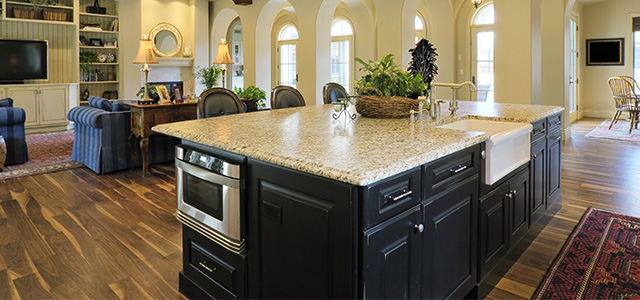When you choose to install granite countertops into your kitchen or bathroom, you are making a purchase that increases the value of your home. Granite provides an elegant look to any type of decor. And when installed by a professional and properly sealed, it is a highly durable material that is resistant to damage from stains, scratches, or heat. It really will stand the test of time. However, proper maintenance and care will ensure the longevity of your investment.
The first step to taking care of granite countertops is to keep them clean. While special granite stone cleansers are available, you can simply use warm water and a mild dish soap. While granite is a very tough stone making it resistant to stains, it is still slightly porous. Therefore, grease can potentially be absorbed. A mild dish soap is able to cut through grease and oil, and prevent stains. In contrast, it is best to avoid any ammonia based cleansers because repeated use can cause the surface to become etched. Likewise, powder-based cleansers should not be used because they are capable of scratching the surface. After cleaning the surface, be sure to dry it with a soft cloth.
Although granite is less susceptible to staining and heat damage, it is still wise to follow some basic precautions. When any substance is spilled on your granite countertops, be sure to wipe it up promptly. Acidic liquids may etch or stain the surface, including but not limited to citrus, wine, or cleaning chemicals. Likewise, even though granite is capable of withstanding high temperatures, it is best not to put hot pots or pans directly on the surface. Instead, use trivets as a buffer against the heat.
When your granite countertops are initially installed, the contractors will seal the stone to protect against damage. With regular use, the sealant should last about one or two years. Although with more rigorous use, the countertops might require re-sealing as frequent as every six months. You can check to see if your countertops require sealing by putting a little bit of water directly on the surface. When your countertops are properly sealed, the water should bead up. If it is easily absorbed, however, then that means it is time to reapply a sealant.
Sealing your countertops is an easy do-it-yourself process. Like when applying a paint or stain, first use masking or painter’s tape to protect walls or any adjacent surfaces that you do not want to come in contact with the sealant. Working with a clean and dry countertop, you will cover the surface until it is completely and thoroughly coated. Once the sealant begins to absorb, you will immediately reapply the sealant, again until it is thoroughly coated. Then, allow the countertops to dry, untouched for at least a half hour. After that time, you will want to wipe off any excess sealant with a clean and soft cloth. Again, regular upkeep and sealing helps to prevent damage from stains. Therefore, this step is important to ensuring the longevity of your investment.
In the event that damage does occur, do not fret. While of course it is best to do what you can to prevent damage, there are some ways to correct it:
- Most stains can be removed with a poultice of flour and either liquid dish soap or hydrogen peroxide. You will want to cover the stained area with the poultice and cover with saran wrap, to keep it moist. Allow it to sit undisturbed for several hours. It might be optimal to apply overnight to allow adequate time to help leech out the stain. Eventually it will dry. Then, use a wooden utensil to scrape off the poultice. Repeat this process as necessary, until the stain has disappeared.
- If your countertops become etched due to contact with an acidic substance, you can treat with a marble polisher. Marble polisher can be found at your local hardware store and comes in a powder form. To use, you will apply the polish directly to your countertops along with some water to moisten. Then, you will buff the surface using a clean, dry cloth.
- Should your countertops become scratched, you can use a dry 0000 steel wool to shine it out.
The fact that granite countertops are extremely durable makes them resistant to damage. However, normal wear and tear can begin to take its toll. Using common sense to avoid damage can prevent needless damage, and regular re-sealing can help to extend the life of your investment. If you follow these tips, you will be able to ensure that your granite countertops remain beautiful for years to come.


